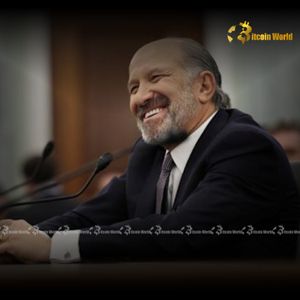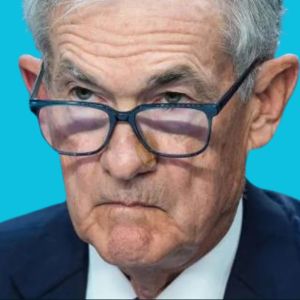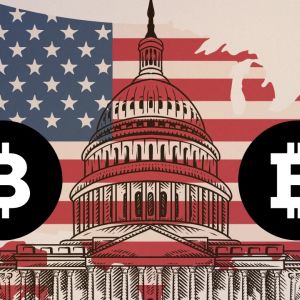BitcoinWorld US Interest Rates: Shocking Criticism from Commerce Secretary Howard Lutnick In the dynamic world of finance and cryptocurrency, understanding the macroeconomic landscape is crucial. Decisions made by key economic leaders can send ripples across all markets. Recently, a significant divergence in opinion emerged from within the U.S. government regarding the state of the US economy and the policies guiding it. What Did Howard Lutnick Say About US Interest Rates? U.S. Commerce Secretary Howard Lutnick , a prominent voice in the administration, took to social media to express his strong views on the current economic situation, particularly focusing on interest rates. Lutnick asserted that despite the United States being the greatest country globally, it is burdened by the highest interest rates among developed nations. This statement directly challenges the prevailing narrative or justification for the current monetary policy stance. His criticism didn’t stop there. Lutnick specifically targeted Federal Reserve Chair Jerome Powell , suggesting that the Fed Chair appeared overly cautious or “afraid of his own shadow.” This metaphor implies that Powell might be hesitant to adjust monetary policy, potentially keeping rates higher than necessary due to undue caution or fear of unforeseen consequences. Are US Interest Rates Really the Highest Among Developed Nations? Lutnick’s claim that the U.S. suffers from the “highest interest rates among developed nations” warrants closer examination. Comparing central bank policy rates across different developed economies requires looking at various factors, including inflation targets, economic growth, and unemployment levels in each country. While the Federal Reserve has aggressively raised its benchmark interest rate (the federal funds rate) since 2022 to combat inflation, other central banks have also tightened their policies. A brief comparison might look like this (rates are approximate and subject to change): United States (Federal Reserve): Target range currently around 5.25% – 5.50% Eurozone (European Central Bank): Main refinancing operations rate around 4.50% United Kingdom (Bank of England): Bank Rate around 5.25% Canada (Bank of Canada): Overnight rate around 5.00% Japan (Bank of Japan): Policy rate remains near zero or slightly positive While the U.S. rates are certainly among the higher end compared to many large developed economies like the Eurozone or Japan, claiming they are definitively the “highest” requires precise data and context across a wide range of developed nations. The statement highlights a perception within parts of the administration that the current rate level is excessive. The Tariff Tug-of-War: Lutnick Disputes Powell’s Claims Beyond interest rates, Howard Lutnick also challenged Jerome Powell on another economic factor: tariffs. Powell had previously suggested that tariffs were contributing to price increases in specific product categories, such as personal computers. Lutnick directly disputed this, pointing out that there are currently no tariffs imposed on personal computers. He clarified the process for potential future tariffs, stating that any decisions regarding tariffs on semiconductors and computers would only be made after the Commerce Department completes its thorough analysis. This indicates a potential disconnect or differing interpretation between the Federal Reserve and the Commerce Department regarding the impact and application of trade policy on consumer prices. Why Does This Disagreement Matter for the US Economy? This public disagreement between a key administration official like Howard Lutnick and the independent head of the Federal Reserve , Jerome Powell , is significant for several reasons: Policy Uncertainty: It signals potential friction within the government regarding the optimal path for the US economy . Such disagreements can create uncertainty for businesses and investors. Inflation Debate: It highlights the ongoing debate about the primary drivers of inflation – is it primarily demand-driven (addressable by high interest rates) or supply-chain/cost-push factors (potentially exacerbated by tariffs or other issues)? Independence of the Fed: While administration officials are free to express their views, direct criticism of the Fed Chair can sometimes raise questions about the political pressure on the independent central bank. Economic Outlook: The differing views on rates and tariffs imply different outlooks on economic growth and inflation control. Lutnick’s comments suggest a concern that high US interest rates might be unnecessarily slowing down the economy. What Are the Potential Challenges and Implications? The challenges arising from such public disagreements are manifold. For policymakers, it requires careful communication to avoid confusing markets. For businesses, it adds another layer of complexity when trying to predict future economic conditions and policy directions. High US interest rates impact borrowing costs for companies and consumers, influencing investment, hiring, and spending decisions. The debate over tariffs also has real-world implications. Tariffs can protect domestic industries but can also increase costs for consumers and businesses relying on imported goods. The Commerce Department’s analysis on semiconductors and computers will be crucial in determining potential future impacts on the tech industry and related prices. Actionable Insights for Navigating Economic Signals While you can’t directly control these high-level policy debates, understanding them provides valuable context: Stay Informed: Pay attention to statements from both the Federal Reserve and administration officials like Howard Lutnick . Look for consistent themes or shifts in perspective. Analyze Data: Don’t rely solely on opinions. Look at actual economic data releases – inflation reports, jobs numbers, GDP growth, and global interest rate comparisons – to form your own informed view on the state of the US economy . Consider Macro Impact: Recognize that macroeconomic policies, including US interest rates and trade policies, influence broader market sentiment and capital flows, which can indirectly affect asset classes like cryptocurrencies. Diversify: Given potential economic uncertainties highlighted by such disagreements, maintaining a diversified investment approach remains a prudent strategy. Compelling Summary: A Clash of Economic Views U.S. Commerce Secretary Howard Lutnick has openly challenged Federal Reserve Chair Jerome Powell on critical aspects of U.S. economic policy, specifically criticizing the level of US interest rates as being among the highest for developed nations and disputing claims about tariffs driving up PC prices. This public disagreement underscores differing perspectives within the government on how best to manage the US economy , control inflation, and promote growth. While the Federal Reserve maintains its independence, such commentary from a high-ranking official highlights the political dimension of economic policy and adds complexity to the overall economic outlook. Market participants and the public will be watching closely to see how these differing views evolve and potentially influence future policy decisions by both the Fed and the Commerce Department. To learn more about the latest economic trends impacting crypto , explore our articles on key developments shaping the US economy and its potential influence on the crypto market . This post US Interest Rates: Shocking Criticism from Commerce Secretary Howard Lutnick first appeared on BitcoinWorld and is written by Editorial Team



















